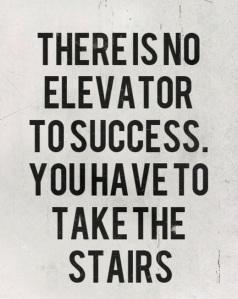
White background with black typeface that says “There is no elevator to success. You have to take the stairs.”
I haven’t climbed steps in at least four years, and prior to that, I only ever struggled my way up and down stairs on rare occasions when it was absolutely necessary. In spite of the absence of regular stair-climbing from my life, I’ve achieved quite a bit over the past 22 years. I’m sharing this not to brag, but to prove a point: disabled people can take the elevator to get to where they need to go and still be successful.
Apparently, many nondisabled people disagree, likely unintentionally. Multiple times, I’ve come across this saying floating around on-line: “There is no elevator to success. You have to take the stairs.” Now, I didn’t spend four years as an English major for it to be lost on me that stairs to success is only a metaphor for the immense effort one must put forth to accomplish great things. I’m sure that the person who came up with the concept that there is no elevator to success certainly didn’t intend to discriminate against millions of disabled people, but nevertheless, there is prejudice at the very crux of this supposedly inspirational quote. The saying is quite often used in the contexts of academic and career success. When the underlying message of the quote is broken down, it essentially points to the idea that only the fittest can reach the top and be successful. This is an ableist notion rooted so deeply in society’s conscience that displays of it nearly always go unnoticed.
Elevators are frequently equated with laziness, seen as a shortcut used by people who can’t be bothered to exert extra effort. However, for people who have certain disabilities, an elevator is not there for us to take the easy way out. While it is true that elevators are a convenience for truly nondisabled people, elevators are simply a means of access for disabled people. Elevators are necessary for people with a wide spectrum of disabilities, from visible mobility impairments to hidden disabilities such as chronic fatigue or arthritis. A lack of certain physical abilities needed to climb stairs does not translate to precluding disabled people from attaining success. That is to say, much of society still perceives disability as a hindrance to achieving things, as though disabled people are second-class citizens. And while my argument against the use of this saying points mainly to physical ableism, I believe I can extend my point to all disabilities. Having a disability need not be seen as a barrier to success and needing accommodations does not mean we are lazy. Society must move beyond these ableist ideas that have become such common assumptions by encouraging and celebrating the successes of people with all different abilities.

